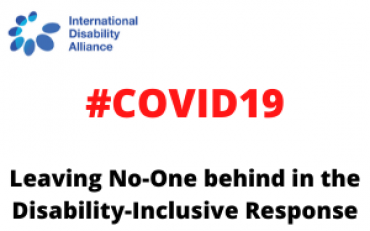This is one story as part of the Voices of People with Disabilities during COVID19 Outbreak series
This story is based on the testimonies shared by The Leprosy Mission, a member of the International Disability and Development Consortium about experience of persons with leprosy from Nigeria. Names have been changed to protect security and privacy of individuals.
Can you hear us? We are members of the Nigerian leprosy communities. Our voices are not being heard, so we are reaching out to you. We too fear the Coronavirus and are looking for help. But it seems like no one is listening.
What happens when COVID-19 threatens an outbreak in our leprosy community? Although hard to imagine, people with leprosy who are already segregated from the rest of society are hurt even more by the pandemic. As individuals with leprosy from four different Nigerian communities, we want to tell you what our lives have been like since the COVID-19 outbreak.
Communal care has stopped. Mutual support empowers the culture of our leprosy community. Problem solving is collective as is emotional support. Picture us as a large family sustaining itself through the challenges and the heartaches of leprosy. But COVID-19 cuts us off from the community. All communal contact ceased with home lockdowns. Village quarantine devastates members because it obstructs people from their life-giving resource: each other.
Adeaze, a 38 year old mother says, “support groups and ulcer care meetings have come to a standstill.” The community depends on these meetings to deal with the physical and mental health challenges that accompany leprosy. Chisimdi a mother who is 35, adds, “The lockdown has greatly impacted my life because I can’t go to my friend’s house to discuss any pressing emotional or psychological issues with her, neither can she come to mine. So, we all have to deal with our problems by ourselves. It sometimes gets overwhelming. I find myself lost in thoughts often.” Because we cannot leave our homes to help one another and to find help for ourselves, we tend to sleep day and night.
Complete systemic breakdown affects our sanitation, health, and employment. As soon as the government restricted all movement outside the home, our community members went into lockdown. That meant that we were neither able to care for ourselves, nor could healthcare workers enter our community. Here a domino-like chain reaction of discrimination and exclusion starts.
First, purified water, sanitation, and hygiene are limited. We have no face masks, gloves, anti-bacterial soaps, or hand sanitizers. With malaria, flu, and other illnesses running rampant, many of us are not well enough to work, much less leave our homes. We also are not able to prevent the spread of disease. This leads to other complications.
Also, quarantine further compromises our health. Medications for malaria, the flu, and other illnesses are unavailable, so we resort to herbal remedies which we admit are limited in effect. Living with leprosy requires palliative care with medications. But Chisimdi says, “Even when government attempts to give out palliatives, we are excluded.” So, not only do we lack health services, particularly medications we also are not able to prevent the spread of other diseases. Adedayo, a 38 year old dad, says, “My wife is down with malaria and we have no money to take her for proper treatment in health center which is already full for patients.” Situations like this lead to the inevitable.
Third, if unable to work, we starve. Many people earn a living through trade and crafts. Adeaze’s husband cannot sell his produce because, in addition to being locked down in their homes people suspect that his produce is contaminated with the virus. So, Adeaze trades a few items then tries to sell them from her home. But few people come to buy from her because they too cannot leave their homes. The Leprosy Mission gave Chisimdi a food processor so that she could grind food for others for a small profit. But no one comes to use her services. Adedayo manufactures and repairs shoes. But in lockdown, he too is unable to earn a living so that he can buy food for his wife and baby daughter. Adeaze fearfully concludes, “If something is not done quickly, a whole lot of us will die of starvation before COVID-19 gets to us.” Although unthinkable, home restriction feels like a death sentence.
Please don’t forget us. Akin, a man who is 70 and leader of a group for people affected by leprosy says that when his government holds meetings to hear the concerns of disabled persons organizations, leaders of groups affected by leprosy like himself are not invited. Once again, their voice is ignored.
What happens when an already closed community moves into home isolation and is ignored? Is it possible to be even more cut off than people with leprosy were before the COVID-19 virus? Chisimdi responds,
“It is like the world has forgotten that we exist.”

